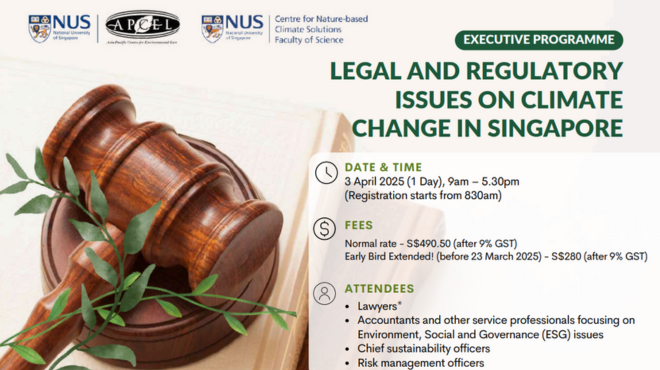In 2021, Singapore’s Parliament declared climate change to be a global emergency. This was a milestone in Singapore’s rapid law and policy-making towards the goal of net-zero greenhouse gas emissions by 2050. This goal is enshrined in international law and Singapore has committed in its Paris Agreement Nationally Determined Contribution (NDC) to achieve it. At the same time, Singapore has identified growth opportunities in the transition towards a low-carbon economy. It aspires to be a regional carbon trading and services hub.
Singapore’s growing body of climate change law features climate change disclosure requirements for major corporations and a Carbon Pricing Act which is accompanied by an International Carbon Credit (ICC) framework. Company directors are being advised to consider climate impacts carefully in their decision-making at the risk of failing to fulfill their legal duties. Regulators are also stepping up against greenwashing to protect consumers and businesses.
This course is designed to provide a comprehensive overview of this rapidly developing regulatory landscape that lawyers and their clients have to navigate.
Speakers:
Melissa Low
Research Fellow
NUS Centre for Nature-based Climate Solutions
Seminar: UN Climate Framework – the Paris Agreement and Singapore’s Nationally Determined Contribution
Peter Zaman
Partner
HFW
Seminar: Legal and Regulatory Issues in Carbon Markets
Joseph Chun
Partner, ESG Practice, Shook Lin & Bok LLP and Adjunct Associate Professor, NUS Law
Seminar: Environmental, Social and Governance (ESG): Latest Legal Developments
Ernest Lim
Vice Dean (Faculty Development), Professor, NUS Law
Seminar: Companies and Climate Change: Directors’ Duties and Disclosure Obligations





